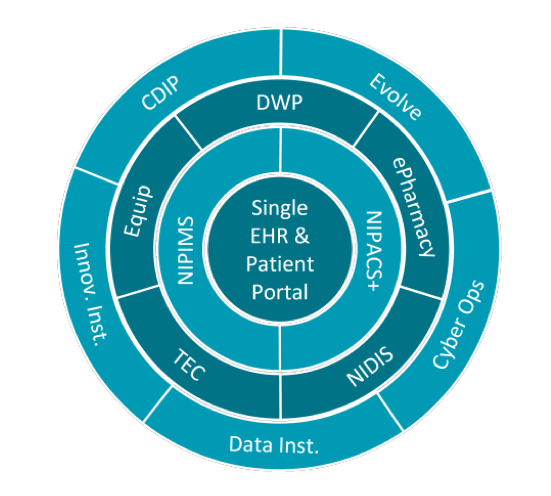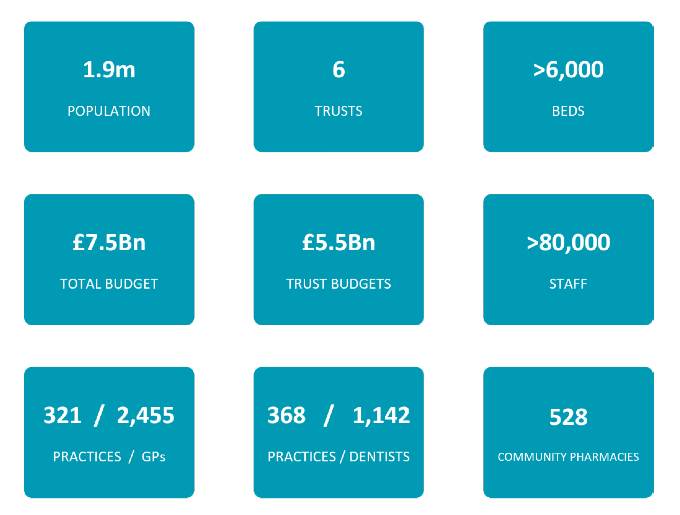Digitalisation and the healthcare transformation jigsaw

Following the milestone launch of an integrated care record system in one of Northern Ireland’s Health and Social Care (HSC) trusts, Chief Digital Information Officer at the Department of Health, Dan West outlines how harnessing the power of data and technology is transforming experiences and outcomes for patients and social care clients.
Encompass, a clinically and operationally led integrated care record system, went live in the South Eastern HSC Trust in early November 2023, representing the first step in implementing a new regional electronic patient record system across all trust settings in Northern Ireland.
“Implementing Encompass will mean our health and social care records will be digitised and can be accessed at the touch of a button. This will mean consistent processes and data, an end to paper records, and an integrated system that puts people at the heart of services,” explains West.
“Immediate access to information about our patients and clients for all HSC workers will make service delivery safer, more efficient, and effective. Information from various existing IT systems that do not currently communicate effectively with each other will be brought together.”
West goes on to say: “Patients, social care clients and their families, and care teams will be brought into the care journey as more active participants, as opposed to silent passengers, with new digital tools and an app that support better information, communication and self-help.”
Encompass will be rolled out to other trusts on a phased basis over the next 18 to 24 months. The Belfast HSC Trust will follow the South Eastern Trust and it will then be implemented in the Northern, Western, and Southern HSC trusts.
While much has been made of the milestone launch, importantly, it is just one of five major ‘go lives’ that will see a transformed set of standardised and consistent clinical and operational processes established across all of the five HSC provider trusts, highlighted by West as evidence of the “incredible industry of work” which has been taking place in the HSC in recent years.
Discussing the progress of the digital transformation in the HSC, the Chief Digital Information Officer highlights the complexity of Northern Ireland’s healthcare ecosystem.
“The HSC in Northern Ireland is unique in the UK as we are an integrated Health and Social Care system – but we are not dealing with a single organisation, there are lots of different entities with statutory responsibilities and their own independent boards and decision-making processes.”
West’s team, Digital Health and Care Northern Ireland (DHCNI), is located at the highest level of the Department of Health, alongside the Strategic Planning and Performance Group (formerly the Health and Social Care Board), and alongside the Public Health Agency.
Underpinning Northern Ireland’s five geographic trusts (alongside the Northern Ireland Ambulance Service as a sixth trust), is the Business Services Organisation (BSO), responsible for network management and the hosting and support of application support amongst other things, as well as a conglomerate of integrated care organisations.
“The ecosystem poses a unique challenge to make changes in a broadly convergent and coherent way,” he stresses.
Digital transformation of Northern Ireland’s HSC has been road mapped by the publication of a Digital Strategy in July 2022, underpinned by a Data Strategy, a Cyber Security Strategy, and an Innovation Strategy, which West says provide an overarching view of what the digital change to the HSC looks like to 2030.
“Our overarching vision is to make lives better for the people of Northern Ireland, using digital to transform the way we deliver health, care and wellbeing services,” he says, elaborating: “We want to create digital touchpoints wherever we can. Where someone in our community is interacting with HSC services, and they are willing to do so using digital channels, we will offer them that opportunity.
“We need equity. We need everybody in Northern Ireland to be able to interact with health and care services in a way that is convenient and suitable for their needs.”
West highlights that the creation of digital touchpoints will bring convenience for service users, while simultaneously boosting service efficiency through increased self-service, releasing the time of professionals to focus on those in greatest need.
Other planned digital improvements include, but are not limited to, streamlined care journeys to help reduce waiting times, personalised treatment plans, cutting-edge diagnostic and treatment solutions, data-driven care, and digital infrastructure investment.
Focusing particularly on what the planned transformation means for systems, West says that alongside the Encompass programme investments are underway for the modernisation of laboratory and pathology services, and medical imaging services.
Other system changes highlighted by West include:
- clinical master patient index changes;
- leveraging Microsoft technology in a digital workplace programme;
- pharmacy system changes to enable digital prescriptions and fulfilment;
- technology enabled care including virtual wards, IoT use and remote diagnostics; and
- enterprise resource planning upgrade for enhanced workforce management and deployment.
West adds: “Surrounding this is a series of other programmes that are somewhat softer in nature. We are building a new data institute, and moving towards a single shared service in the way that we employ and deliver technology. We are also going to build a cyber operations centre, so that we can concentrate some of our skills and capabilities around cyber operations and threat detection.
“Finally, we are building a new relationship with citizens through a new citizen digital identity platform.”
Transformation
West stresses an understanding that while a lot of heavy-duty investment is underway, digital transformation of Northern Ireland’s health and social care system is not really about technology, rather it is about innovative changes to how public services are delivered in Northern Ireland.
“In the main, that does not come from big heavy lifting programmes, but actually leveraging foundational technology capabilities and investments to completely reimagine how we deliver services and reimagine that currently linear relationship between the growing demand for services and our current response, which has been to grow human resources to deliver those outcomes.”
The Chief Digital Information Officer says that reimagining that linear relationship is the only way health and social care, and other sectors of the public sector in Northern Ireland, are going to be sustainable for the future.
“AI and automation are part of that journey, but crucially, there are some big technology investments that will transform the way we deliver health and care in 10 years’ time that are not bleeding edge technologies. Instead, they are the basics of decent workflow management, and decent digital enablement for staff and consumers of the services being delivered.”
West explains that in time, DHCNI will shift from the currently, necessary integration of “heavy-lifting technology” investment programmes towards optimisation, making best use of those technologies and then innovating the way care models are designed to leverage those foundations in new and different ways.
Concluding, he says: “In 10 years, health and social care will not look like they do today. We need transformation and while digital is not a panacea, it is most definitely a big jigsaw piece in how we get to a different future.”
|
Encompass: In focus Northern Ireland’s HSC service partnered with global company Epic to build Encompass, which will create a single digital care record for every citizen in Northern Ireland who receives health and social care. Epic, as a global provider, provides electronic records for over 300 million people across the globe for health and social care systems. It is expected that the new electronic patient record will be available across the entire Northern Ireland’s health system by the end of 2025, and, uniquely in the UK, includes social care. West outlines what this change will mean for patients and social care clients: “It will allow service users to view information in a way not previously available to the public in Northern Ireland. As well as digitally accessing test results, Encompass will allow you to choose how you want to communicate with health and social care staff and contact them directly about your needs as an individual as part of the care episode.” Explaining that Encompass will provide improved continuity of care for HSC patients, clients, and service users, he states: “Those who deliver care will have secure access to real-time patient information, helping to reduce duplication of services and minimising the risk of errors. Patients will not have to repeat information to different professionals providing care or have to repeat tests in different locations. Patients will be able to provide relevant, up-to-date information to support the professionals looking after them to manage their condition better.” On the potential efficiencies provided by Encompass, the Chief Digital Information Officer says: “It will not only reduce paper files, but also provide a single place for storage of information, offering an improved quality of care but also maintaining the privacy of individuals and their rights to privacy of their data. “Population health-level analytics enables better service planning and better placement of assets and resources to deliver care in the community, where it is most needed.” Pointing to a range of health benefits, including a reduction in prescription errors, and a reduction of risk-adjusted mortality index scores, West adds: “It also provides better access to technology at the point of care. We are, alongside the rollout of the application, rolling out a suite of additional infrastructure including a programme for investment in devices, putting them in the hands of healthcare professionals who have not previously interacted with technology. “There is a recognition that written notes are dead for research and innovation purposes. Using technology will enable greater efficiency, greater data quality, and better opportunities for GDP contribution through research and innovation.” Summarising changes to date, West says: “We have moved a long way in a short space of time. In Northern Ireland, the public sector often feels difficult to drive transformation and we have been on a journey to change the culture, to be proactive, collaborative, conducive and engaged. “The go live of Encompass is massive, and it is built on the shoulders of an incredible industry of work going on in health and social care in Northern Ireland.” |







